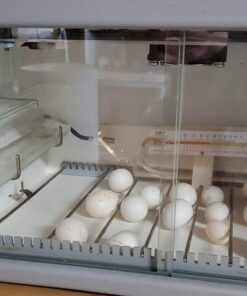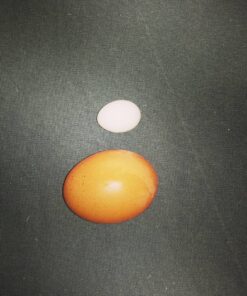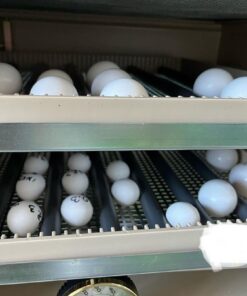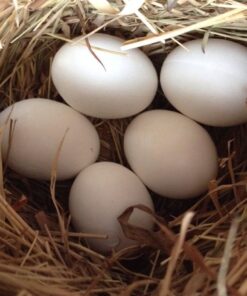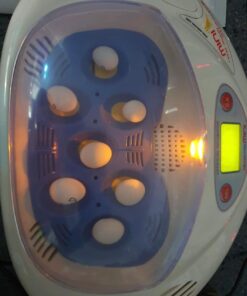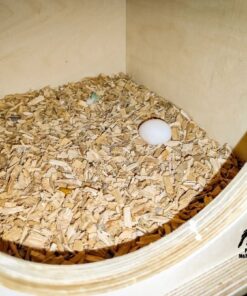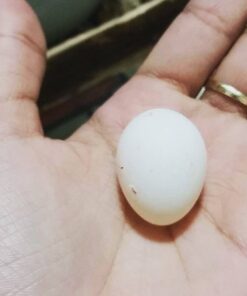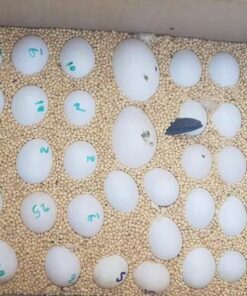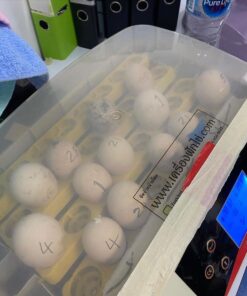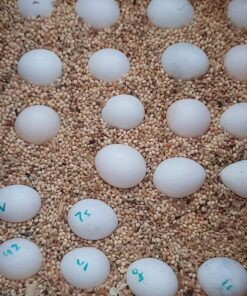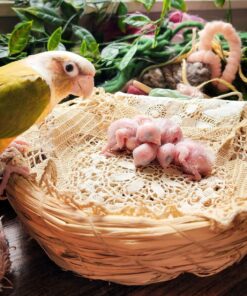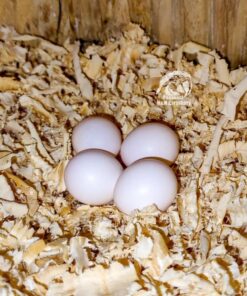Fertile Parrot Eggs: A Comprehensive Guide to Successful Breeding
Breeding parrots is a rewarding endeavor that requires dedication, knowledge, and an understanding of the key factors that influence the fertility of parrot eggs. Whether you are an experienced aviculturist or just starting out, this guide provides you with detailed information on how to maximize the fertility of parrot eggs and ensure successful hatching.
Understanding Fertile Parrot Eggs
Fertile parrot eggs are those that have been successfully fertilized by a male parrot, and if incubated under the right conditions, they have the potential to develop into healthy chicks. Identifying fertile eggs and understanding the conditions required for their development are crucial steps in the breeding process.
Signs of Fertility in Parrot Eggs
To determine if a parrot egg is fertile, it is essential to candle the egg. Candling involves shining a bright light through the egg to observe its contents. Fertile eggs will show visible signs of embryonic development, such as blood vessels, a dark spot (the developing embryo), and a distinct change in the yolk’s appearance. Infertile eggs, on the other hand, will appear clear or have a cloudy yolk with no signs of development.
Candling Procedure:
- Prepare a Dark Environment: Candling should be done in a dark room to make it easier to see inside the egg.
- Use a Strong Light Source: A high-intensity LED flashlight or a specialized egg candler works best for this process.
- Hold the Egg Gently: Position the egg between the light source and your eye, rotating it slowly to examine all parts of the egg.
- Look for Signs of Fertility: After 7-10 days of incubation, a fertile egg will exhibit distinct blood vessels and possibly an embryo.
Factors Affecting Fertility in Parrot Eggs
Several factors can influence the fertility of parrot eggs, including the health and age of the breeding pair, their diet, and the environment in which they are kept.
- Health of the Breeding Pair:
- Age: Parrots reach sexual maturity at different ages depending on the species, but it is generally around 3-5 years. Breeding pairs should be in their prime reproductive years to ensure high fertility rates.
- General Health: Both male and female parrots should be in optimal health. Regular veterinary check-ups, a balanced diet, and adequate exercise are essential.
- Genetics: The genetic compatibility of the breeding pair plays a significant role in the fertility of the eggs. Some pairs may be more genetically compatible than others, leading to higher fertility rates.
- Diet and Nutrition:
- Balanced Diet: A diet rich in vitamins, minerals, and essential nutrients is vital for reproductive success. This includes a variety of fruits, vegetables, seeds, and high-quality commercial parrot food.
- Calcium Intake: Calcium is especially important for female parrots, as it is required for the production of strong eggshells. Calcium supplements or foods high in calcium, such as cuttlebone, are recommended.
- Breeding Supplements: Specific breeding supplements are available that enhance fertility and improve the chances of producing fertile eggs.
- Environmental Conditions:
- Nest Box: Providing an appropriate nest box is critical for encouraging breeding. The box should be spacious, secure, and placed in a quiet, low-traffic area to reduce stress on the birds.
- Temperature and Humidity: The breeding environment should mimic the parrot’s natural habitat. This includes maintaining a stable temperature and appropriate humidity levels, which are crucial for egg development.
- Light Cycle: Parrots require a proper light cycle to stimulate breeding behavior. Mimicking natural daylight hours can help trigger reproductive hormones.
Incubation of Fertile Parrot Eggs
Once you have determined that the eggs are fertile, the next step is incubation. Incubation can be done either naturally by the parent birds or artificially using an incubator.
Natural Incubation
In natural incubation, the parent birds take on the responsibility of keeping the eggs warm and turning them regularly. This method is often preferred as it mimics the natural breeding process. However, it is important to monitor the parent birds to ensure they are properly caring for the eggs.
Key Points for Natural Incubation:
- Parental Behavior: Ensure that the parents are attentive and spending adequate time on the eggs. If the female or male shows signs of neglect, you may need to intervene.
- Minimize Disturbance: Avoid handling the eggs or disturbing the nest box during the incubation period, as this can cause stress to the parents and potentially harm the eggs.
- Regular Monitoring: Check on the eggs periodically, but do so discreetly to avoid alarming the parents.
Artificial Incubation
Artificial incubation involves using an incubator to replicate the conditions necessary for egg development. This method is often used when the parent birds are unable or unwilling to incubate the eggs.
Steps for Artificial Incubation:
- Choosing the Right Incubator: Select an incubator that allows for precise control of temperature and humidity. Forced-air incubators are generally preferred for their even distribution of heat.
- Setting the Temperature: Parrot eggs require a temperature of approximately 99.5°F (37.5°C) for successful incubation.
- Maintaining Humidity: The humidity level should be kept around 50-55% during the first part of the incubation period and increased to 65% during the final days before hatching.
- Turning the Eggs: Eggs need to be turned several times a day to prevent the embryo from sticking to the shell. Automatic incubators often have a built-in turning mechanism, but manual turning is also effective.
Hatching and Post-Hatching Care
The hatching process is a critical phase in the breeding cycle. Parrot chicks typically take 24 to 48 hours to fully emerge from their eggs after the initial pip (crack in the eggshell).
Monitoring the Hatching Process
- Watch for Pipping: Once you notice a pip, it indicates that the chick is ready to hatch. Avoid intervening unless absolutely necessary, as premature assistance can harm the chick.
- Provide Adequate Humidity: Maintaining high humidity levels is crucial during hatching to prevent the chick from becoming stuck to the shell.
- Allow Time: Hatching is a strenuous process for the chick. Give it time to break free from the shell naturally.
Caring for Newly Hatched Chicks
- Warmth: Chicks should be kept warm in a brooder with a stable temperature of around 95°F (35°C) for the first week, gradually reducing the temperature as they grow.
- Feeding: Initially, chicks rely on crop milk produced by the parent birds. In the absence of parents, hand-feeding with a specialized formula is necessary.
- Hygiene: Keep the brooder clean and dry to prevent infections and ensure the chicks are developing in a healthy environment.
Conclusion
Breeding parrots and caring for fertile parrot eggs is a complex but highly rewarding process. By ensuring the health of your breeding pair, providing optimal environmental conditions, and carefully managing the incubation and hatching process, you can significantly increase your chances of success.
-
- Fertile Egg/parrot eggs
Amazon Parrot Eggs
- Fertile Amazon Parrot Eggs For Sale Amazon Parrot Eggs comes with hatching incubator hand booklet. Sales contract document. We sell all our Amazon Parrot Eggs, Only when the eggs are 7 days old. All Amazon Parrot Eggs available now. Our shipping and delivery is 100% safe and guaranteed.
- Log in to view price and purchase
-
- Fertile Egg/parrot eggs
Baudin’s black cockatoo Eggs
- Baudin's black cockatoo Eggs Baudin's black cockatoo, also known as the long-billed black cockatoo (Calyptorhynchus baudinii), is a species of black cockatoo endemic to the southwest of Western Australia. It is named in honor of the French explorer Nicolas Baudin. Here are some key features and facts about Baudin's black cockatoo: Physical Description - Size: They are relatively large birds,…
- Log in to view price and purchase
-
- Fertile Egg/parrot eggs
Blue-Fronted Amazon Eggs
- Comprehensive Outline for Blue-Fronted Amazon Eggs Main Heading Subheading 1. Introduction 1.1 What are Blue-Fronted Amazon Eggs? 1.2 Importance of Understanding Avian Eggs 1.3 Overview of the Article 2. Blue-Fronted Amazon Parrot Overview 2.1 Species Background and Characteristics 2.2 Natural Habitat and Distribution 3. Reproduction and Breeding 3.1 Mating Behaviors 3.2 Nesting Habits 3.3 Egg Laying Process 4. Characteristics of…
- Log in to view price and purchase
-
- Fertile Egg/parrot eggs
Blue-Throated Macaw Eggs
- Blue-Throated Macaw Eggs Blue-throated macaws (Ara glaucogularis), also known as Caninde macaws, are critically endangered parrots native to a small region in Bolivia. Their eggs and reproductive habits are vital to conservation efforts aimed at increasing their population. Here’s a detailed look at their eggs and breeding behaviors: Nesting and Breeding - Nesting Sites: Blue-throated macaws typically nest in tree…
- Log in to view price and purchase

